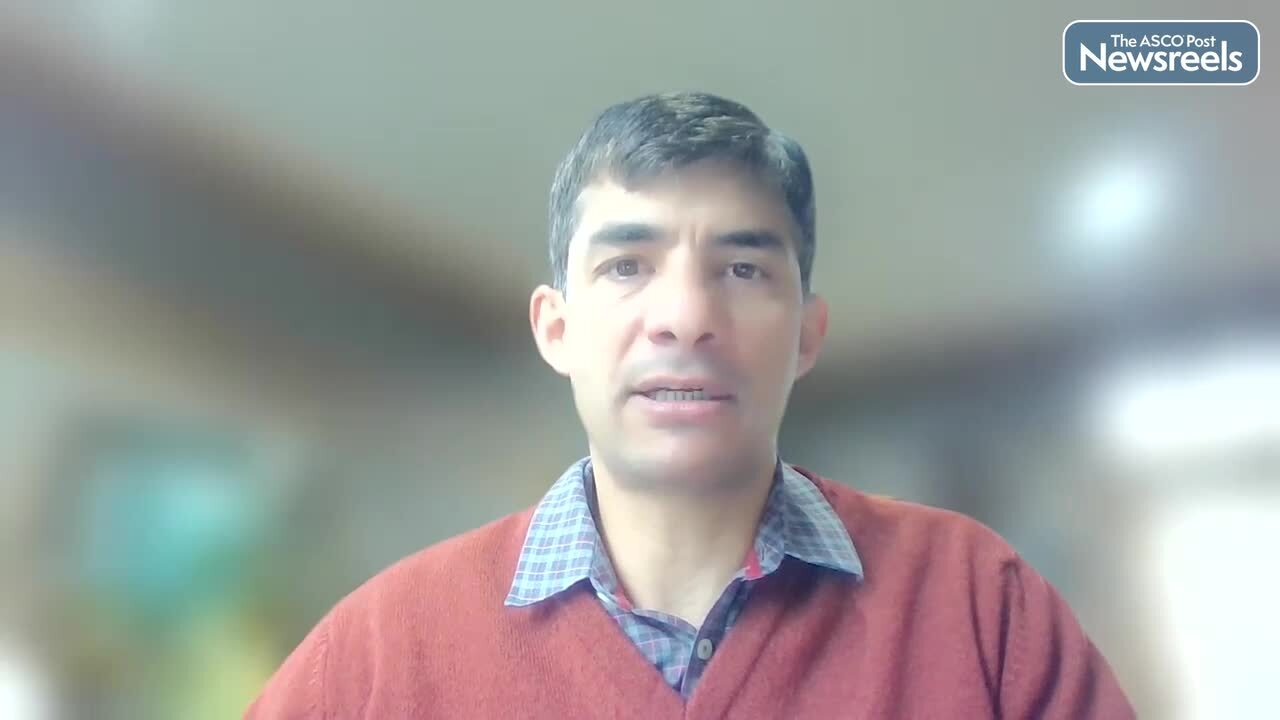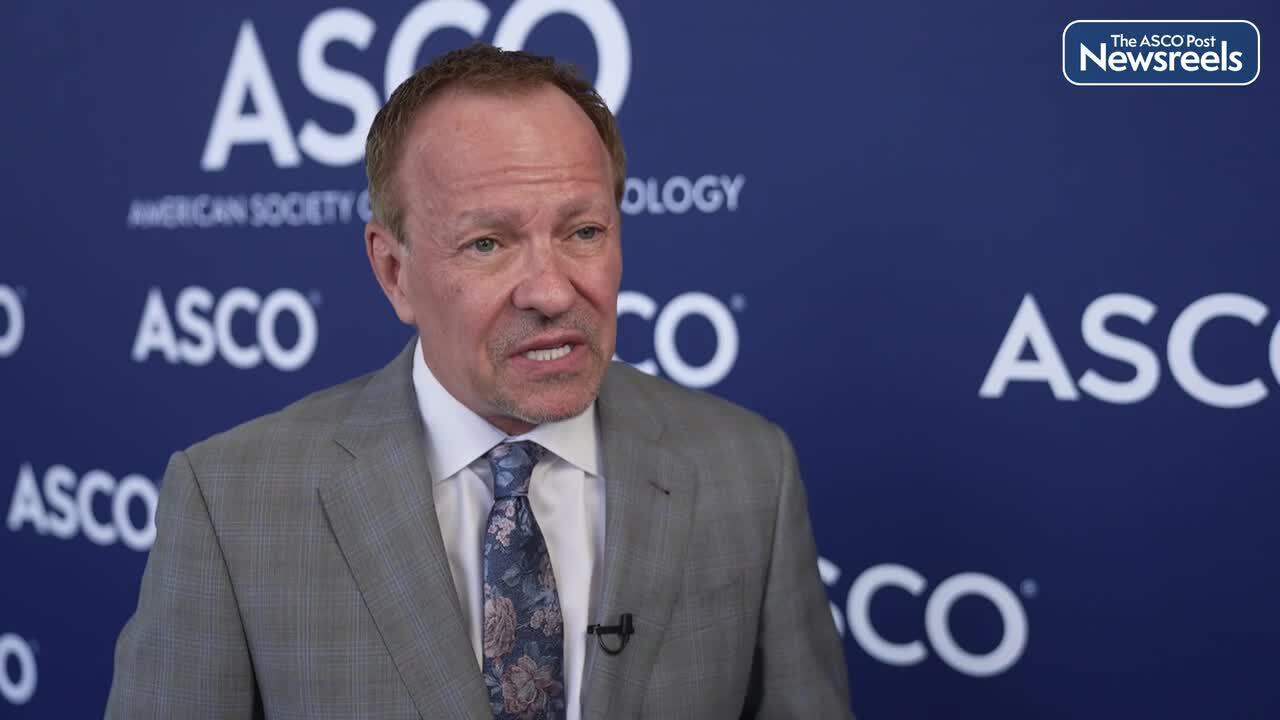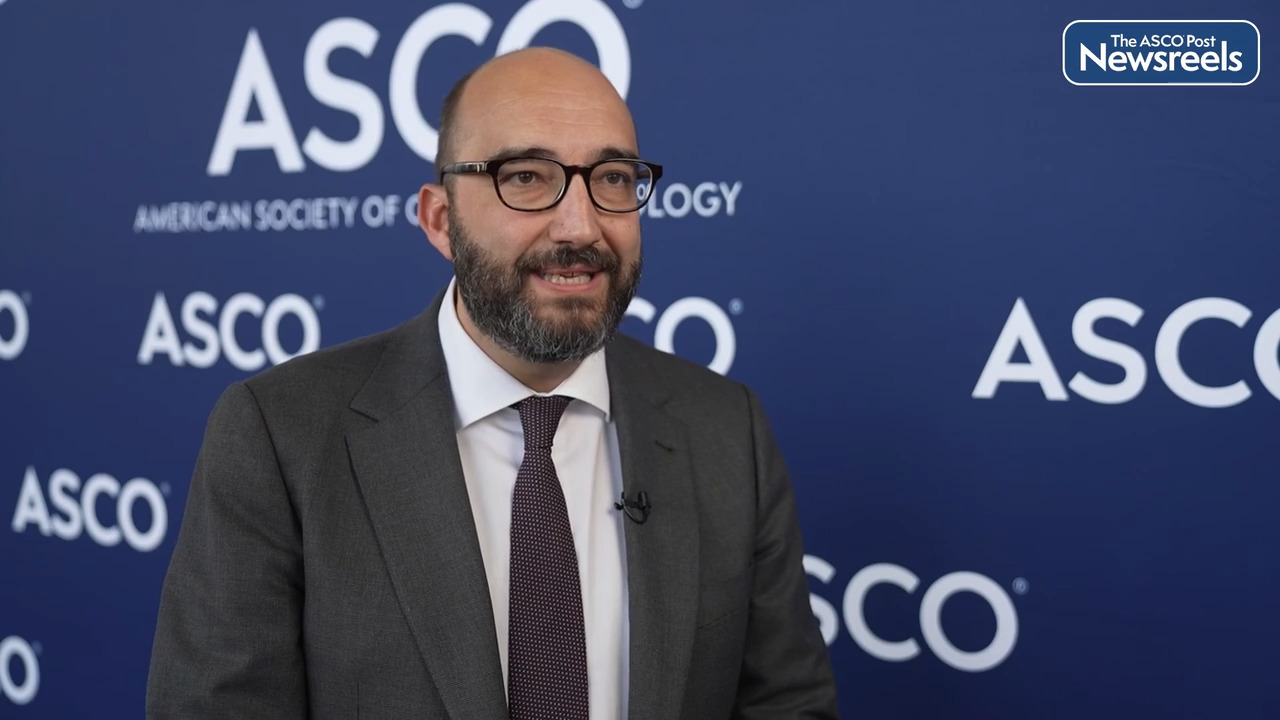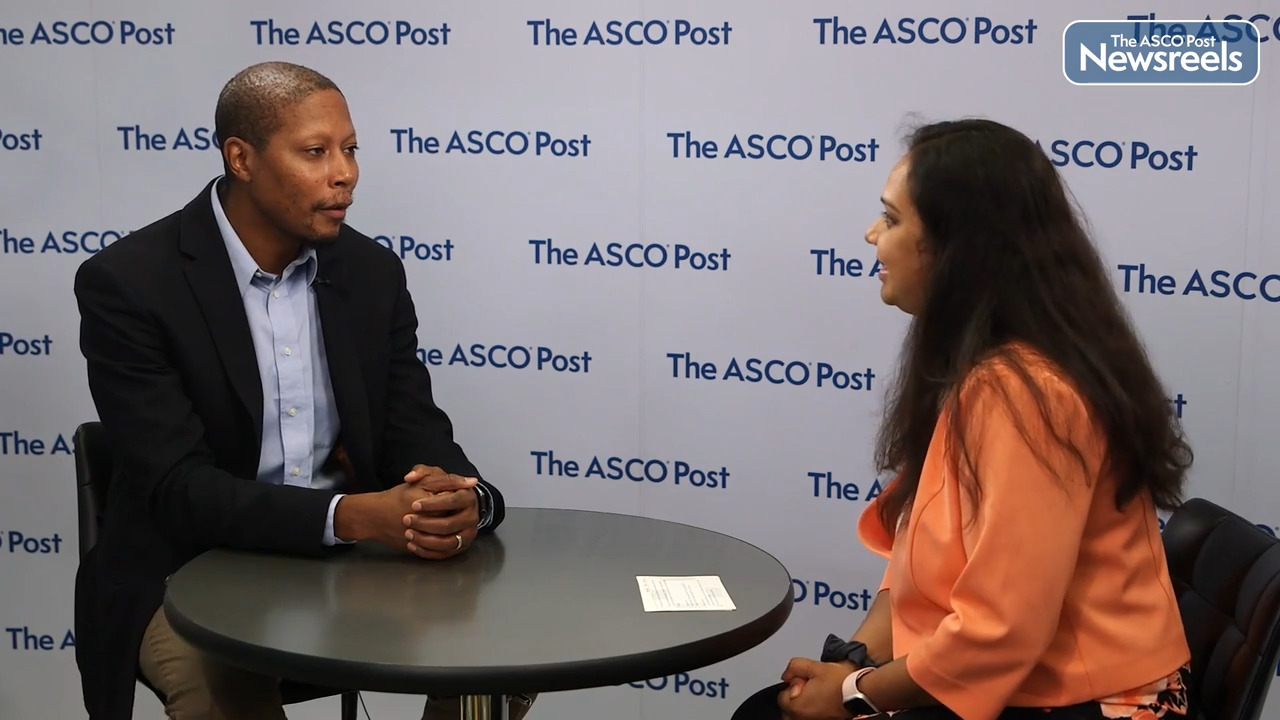Sebastian Stintzing, MD, on Colorectal Cancer: Influence of Liquid Biopsy in First-Line Combination Treatment
2023 ASCO Annual Meeting
Sebastian Stintzing, MD, of the Charité Universitätsmedizin Berlin, discusses results from the phase III FIRE-4 study, which showed that liquid biopsy is clinically relevant in verifying mutational status in patients with metastatic colorectal cancer and is efficacious in first-line treatment of FOLFIRI and cetuximab for patients with RAS wild-type disease (Abstract 3507).
Transcript
Disclaimer: This video transcript has not been proofread or edited and may contain errors.
The purpose of the FIRE-4 study was to test whether a switch maintenance from an anti-EGFR containing regimen first-line to bevacizumab plus [inaudible 00:00:19] would prevent upcoming RAS mutations as secondary resistant factors and therefore prolong progression-free survival over the median time that is reached with the standard treatment of FOLFIRI plus cetuximab. Therefore, we randomized 672 patients in either FOLFIRI plus cetuximab until progression or intolerable toxicity versus FOLFIRI cetuximab up to eight and 12 cycles, and then switch maintenance towards [inaudible 00:00:52] and bevacizumab.
Primary endpoint of the first line treatment was PFS and we have published this in last year, we did not reach a PFS. PFS of both arms was comparable. At this ASCO, we present the data of the liquid biopsy translational program. We took liquid biopsies at the beginning, at baseline, at the 6 to 12 cycles within treatment. And then at the end of the treatment, at progression. What was quite unexpected, this was a RAS wide type population by tissue-based testing within the liquid biopsy, we were able to find 13% of patients having a RAS mutation at baseline. And the outcome of those patients were as expected for RAS mutant patients. At PFS of roundabout nine months and overall survival of 22 months, whereas the double Y type population, the RAS and BUFY type population exceeded the PFS with 11.5 months and then overall exceeding in median 33 months.
We also had the on treatment measurement of liquid biopsy and was quite interesting. It took in median 48 weeks until the RAS mutation came up in those patient treated continuously with anti-EGFR treatment. Almost after one year of treatment, there were upcoming RAs mutations and we found those in round about 19%. One out of five patients got to this RAS mutation. It did not impact overall survival.
What are our conclusions here? First of all, baseline liquid biopsy is important to find the right patient population and to sort out those patient who may have a RAS wide type tumor by tissue-based analysis, but a RAS mutant tumor by liquid biopsy because those patients do not derive benefit from anti-EGFR treatment. At baseline it's important, it's meaningful. During treatment, we think there's no meaning for the RAS testing by liquid biopsy because those patients who actually got a RAS mutation during treatment have a very long treatment time, are on treatment for almost a year. And it has no impact on overall survival.
What would be the next steps? In my opinion, we should do a liquid biopsy in our clinical practice before starting anti-EGFR treatments or at baseline to cover tumor heterogeneity and to cover the real RAS mutational status of our patients that we want to treat. B, I think it'll be important to find a threshold during treatment where we can apply treatment holidays. Where's the threshold? How far can we actually treat the patients? How far can we shrink down the tumor volume until it is safe to say, okay, now we can do a treatment holiday, just to give the patient a break and from a patient perspective to have a better quality of life during this treatment course.
Related Videos
The ASCO Post Staff
Shailender Bhatia, MD, of the University of Washington and Fred Hutchinson Cancer Center, discusses phase I/II results on the efficacy of nivolumab with or without ipilimumab in patients with recurrent or metastatic Merkel cell carcinoma. The study found that, for this rare and aggressive skin cancer, nivolumab showed clinical activity in advanced disease. However, these results from CheckMate 358 do not suggest an additional benefit with ipilimumab added to nivolumab (Abstract 9506).
The ASCO Post Staff
Bradley J. Monk, MD, of the University of Arizona, Phoenix, and Creighton University, discusses phase III findings from the KEYNOTE-826 study of overall survival results in patients with persistent, recurrent, or metastatic cervical cancer. Study participants received first-line treatment of pembrolizumab plus chemotherapy, with or without bevacizumab, which reduced the risk of death by up to 40% in three different subsets of patients (Abstract 5500).
The ASCO Post Staff
Enrique Grande, MD, of The University of Texas MD Anderson Cancer Center, discusses new findings that show initial responses to induction therapy with atezolizumab plus platinum and gemcitabine did not seem to impact overall survival for patients with metastatic urothelial carcinoma. Cisplatin-treated patients appeared to derive a greater benefit with atezolizumab than did carboplatin-treated patients (Abstract 4503).
The ASCO Post Staff
Tycel J. Phillips, MD, and Swetha Kambhampati, MD, both of City of Hope National Medical Center, discuss new findings showing that the real-world effectiveness and safety of brexucabtagene autoleucel were similar to data from the pivotal ZUMA-2 trial in patients with relapsed or refractory mantle cell lymphoma, regardless of prior BTK inhibition, bendamustine, or autologous stem cell transplantation (Abstract 7507).
The ASCO Post Staff
Rana R. McKay, MD, of the University of California, San Diego, and Toni K. Choueiri, MD, of Dana-Farber Cancer Institute and Harvard Medical School, discuss results from the phase III CONTACT-03 study, showing that, for patients with metastatic renal cell carcinoma (RCC), adding the PD-L1 inhibitor atezolizumab to cabozantinib did not improve clinical outcomes compared with treatment with cabozantinib alone. In addition, higher toxicities were observed in the combination arm (Abstract LBA4500).





